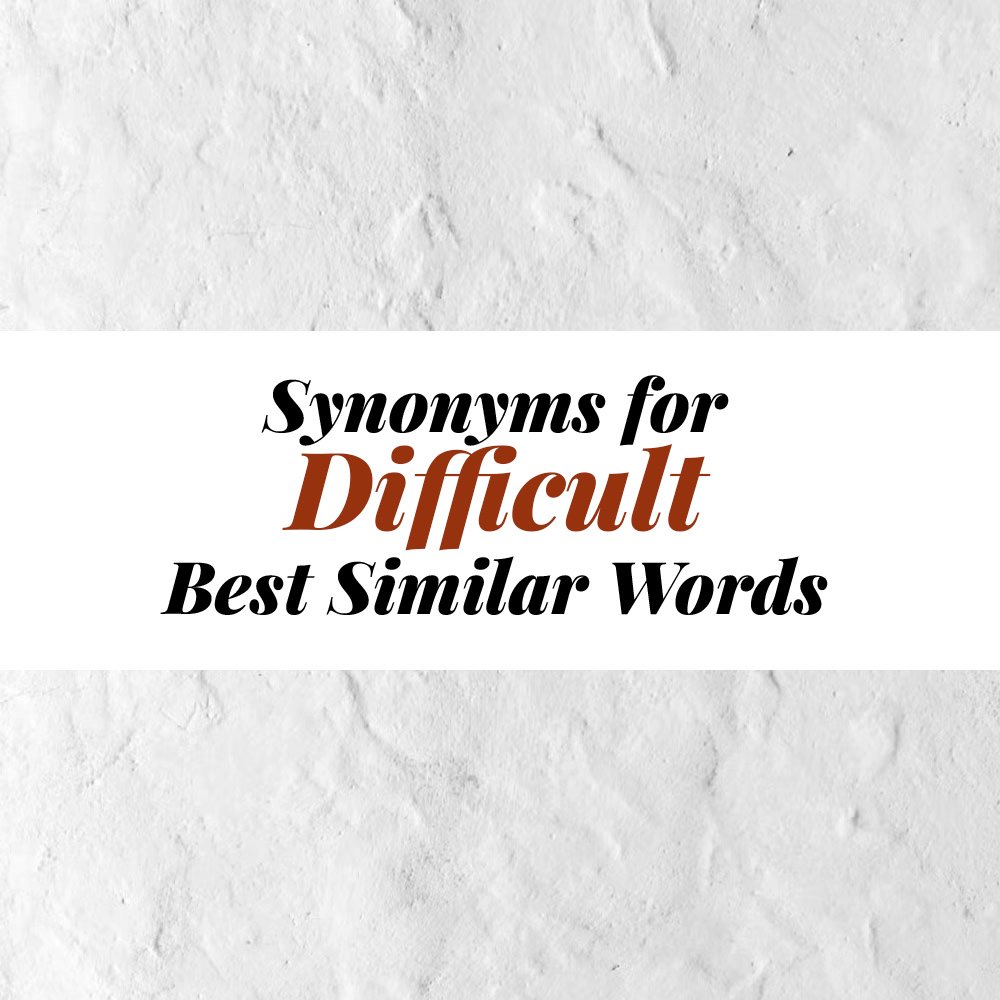Struggling to find the right word instead of “difficult”? Whether you’re writing an essay, an email, or just chatting, there are plenty of alternatives to make your point stronger. Words like challenging, tricky, or tough can fit different situations. In this article, we’ll explore 23 different ways to say difficult, complete with explanations and examples.
23 Different Ways to Say DIFFICULT: Another Word for DIFFICULT
1. Challenging
Challenging is a great synonym when you want to show that something requires effort but is achievable. It’s perfect for tasks that push your limits without being impossible. You can use it in work, school, or personal projects. The word adds a positive spin, implying growth and learning. Use it when you want to motivate someone or describe a task that tests skills. It works well in both formal and informal situations. Using challenging makes your sentence feel thoughtful and dynamic, rather than just labeling something as hard.
- The hike up the mountain was challenging but rewarding.
- Learning a new language can be challenging for beginners.
- Completing the project in two days was challenging for the team.
2. Tricky
Tricky implies that something is hard because it requires careful thinking or cleverness. It’s often used when the difficulty comes from subtle problems or unexpected complications. Tricky situations need attention and strategy. It’s useful in both casual conversations and work discussions. Tricky adds a playful or cautious tone, showing respect for the complexity of the task. You can also use it for puzzles, negotiations, or tricky decisions. This word shows that difficulty isn’t always physical—sometimes it’s mental or situational.
- The math problem was tricky, but I figured it out.
- Negotiating the contract terms was tricky for the new manager.
- The tricky part of the recipe is making the sauce just right.
3. Tough
Tough is versatile and conveys that something is strong, demanding, or hard to handle. It’s suitable for physical challenges, mental strain, or emotional difficulties. You can use it in personal experiences, sports, or work situations. Tough also has a resilient connotation, suggesting the person facing it will grow stronger. It’s a common word, making it widely understood and relatable. When you describe a task as tough, it communicates respect for the effort required. It can also describe situations that are not pleasant but manageable.
- The exam was tough, but I managed to pass.
- Finishing the marathon was tough on my legs.
- Dealing with customer complaints can be tough sometimes.
4. Arduous
Arduous emphasizes effort, endurance, and persistence. It’s ideal for tasks that take a long time or require patience. Arduous works well in academic, professional, or adventurous contexts. It suggests that success is possible but demands commitment. Using arduous makes your description sound serious and precise. It’s great for essays, articles, or formal writing. This word helps highlight the struggle and effort involved rather than just saying something is hard.
- The journey across the desert was arduous.
- Writing the thesis was an arduous process.
- Training for the competition proved to be arduous.
5. Complicated
Complicated highlights that something has many parts or is difficult to understand. It’s perfect for systems, processes, or relationships that aren’t straightforward. Complicated suggests that effort and careful attention are needed. This word fits professional, educational, or everyday contexts. It shows that the challenge comes from layers, not just effort. Using complicated can help clarify why something is hard and guide someone on how to approach it.
- The instructions were complicated, so I had to read them twice.
- Their relationship is complicated but meaningful.
- The software setup is complicated and takes time to master.
6. Grueling
Grueling conveys extreme effort and exhaustion. It’s ideal for describing tasks that drain energy physically or mentally. Grueling adds intensity and makes the challenge feel serious. It’s often used for sports, work, or travel experiences. This word communicates endurance and the toll taken on someone. Using grueling can help readers understand just how demanding a task is. It emphasizes persistence and stamina as key factors.
- The 12-hour shift was grueling.
- Climbing the steep trail was grueling for the hikers.
- Preparing for the exam was a grueling experience.
7. Formidable
Formidable suggests a challenge that is intimidating or awe-inspiring. It’s suitable for opponents, obstacles, or tasks that demand respect. Formidable emphasizes difficulty and magnitude rather than effort alone. It’s perfect for professional writing, sports, or personal achievements. Using formidable gives weight and significance to the challenge. It’s great when you want to show that overcoming it is impressive.
- The opponent was formidable, but we won the match.
- Climbing the peak was a formidable adventure.
- Writing the report on tight deadlines was formidable.
8. Laborious
Laborious focuses on effort, work, and time. It describes tasks that are physically or mentally tiring. Laborious is great for detailed projects, cleaning, or study tasks. This word communicates diligence and persistence. Using laborious highlights the process and commitment involved. It’s useful for work reports, academic writing, or storytelling. Laborious implies that success is achieved through effort, not luck.
- Sorting all the files was a laborious task.
- The project required laborious calculations.
- Completing the manuscript was a laborious journey.
9. Backbreaking
Backbreaking refers to work that is extremely physically demanding. It conveys intensity and extreme effort. Backbreaking is suitable for describing construction, labor, or heavy physical activity. This word emphasizes the strain and exhaustion involved. It adds drama and seriousness to the description. Using backbreaking communicates just how physically taxing a task is. It’s perfect for storytelling or highlighting hard work.
- Moving all the furniture was backbreaking.
- Harvesting the crops was backbreaking labor.
- The construction work was backbreaking for the team.
10. Knotty
Knotty implies tangled or complex problems. It’s used when challenges are tricky to unravel or solve. Knotty is ideal for intellectual, legal, or technical difficulties. It emphasizes the need for careful thinking. Using knotty adds precision and interest to your description. It’s great when you want to describe something that isn’t straightforward. Knotty conveys both difficulty and intricacy.
- The legal issue was knotty and required expert advice.
- Solving the puzzle was knotty but fun.
- The knotty problem took hours to figure out.
11. Rigorous
Rigorous focuses on strictness, discipline, and precision. It’s perfect for tests, training, or standards that demand thoroughness. Rigorous emphasizes challenge through rules and high expectations. Using rigorous highlights both effort and careful execution. It’s ideal for academic, professional, or fitness contexts. This word makes difficulty feel structured and purposeful.
- The training program was rigorous but effective.
- The exam was rigorous and tested all topics.
- The quality control process was rigorous.
12. Thorny
Thorny suggests obstacles that are tricky and potentially uncomfortable. It’s often used for debates, issues, or social problems. Thorny conveys difficulty and sensitivity. Using thorny shows that care and strategy are needed to navigate challenges. It’s perfect for analytical writing or discussions. Thorny emphasizes nuance and complexity rather than brute effort.
- The negotiation became thorny with unexpected demands.
- Addressing the thorny issue required tact.
- The topic was thorny, causing heated debates.
13. Strenuous
Strenuous highlights intense physical or mental effort. It’s often used for exercise, work, or challenging tasks. Strenuous communicates exertion and persistence. Using strenuous helps readers understand the level of difficulty and commitment needed. It’s ideal for sports, outdoor activities, or demanding projects. Strenuous makes effort tangible and relatable.
- The workout was strenuous but effective.
- Climbing the hill was strenuous for the group.
- Completing the report was a strenuous task.
14. Taxing
Taxing indicates that something is mentally or physically draining. It’s suitable for long, demanding, or stressful activities. Taxing emphasizes effort and strain. Using taxing communicates the toll a task takes. It’s perfect for office work, studies, or personal projects. Taxing highlights that difficulty impacts energy and focus.
- The long meeting was taxing for everyone.
- Managing multiple projects is taxing but rewarding.
- The final exams were mentally taxing.
15. Herculean
Herculean implies enormous effort or strength required. It’s perfect for tasks that seem almost impossible. Herculean is dramatic and emphasizes accomplishment. Using Herculean adds flair and admiration for overcoming challenges. It’s great for storytelling or motivational writing. The word conveys that the task demands exceptional determination.
- Lifting the heavy stones was a Herculean effort.
- Completing the marathon was a Herculean achievement.
- Organizing the festival was Herculean work.
16. Onerous
Onerous describes a duty or task that is burdensome or oppressive. It emphasizes obligation and weight rather than physical effort alone. Onerous is ideal for legal, work, or administrative contexts. Using onerous communicates responsibility and seriousness. It highlights that the difficulty comes from responsibility.
- Paying the taxes felt onerous this year.
- The contract had onerous clauses.
- Completing the documentation was an onerous task.
17. Formidable
Formidable stresses that something inspires respect due to its difficulty. Often used for opponents, obstacles, or tasks that are intimidating. Formidable emphasizes challenge and achievement. Using formidable highlights effort and admiration. Suitable for academic, professional, or personal contexts.
- The competitor was formidable, yet we prepared well.
- Climbing the cliff was formidable for the group.
- Launching the new project seemed formidable.
18. Demanding
Demanding conveys that something requires attention, effort, and skill. It’s perfect for tasks, roles, or situations that require high performance. Demanding emphasizes effort and persistence. Using demanding highlights responsibility and focus. It’s great for professional, academic, or personal challenges. The word communicates both effort and expectations.
- The job was demanding but fulfilling.
- Parenting can be demanding at times.
- Preparing the presentation was demanding.
19. Compelling
Compelling can describe something that is difficult because it captures attention and requires engagement. It’s often used for ideas, tasks, or arguments that challenge understanding. Compelling emphasizes the need to focus and think critically. Using compelling helps convey intellectual or emotional difficulty. It’s perfect for writing, teaching, or presentations.
- The debate topic was compelling and required research.
- Reading the complex book was compelling.
- The case study was compelling for students.
20. Sticky
Sticky refers to situations that are tricky or hard to handle. Often used in social or professional contexts. Sticky emphasizes nuance and careful approach. Using sticky helps convey difficulty without physical effort. It’s ideal for conversations, negotiations, or problem-solving. Sticky communicates complexity and challenge.
- The contract issue was sticky to resolve.
- The political situation is sticky.
- Handling customer complaints can be sticky.
21. Challenging
Challenging shows that a task requires effort, skill, and persistence. Suitable for professional, educational, or personal contexts. Challenging emphasizes growth and learning. Using challenging motivates and encourages tackling tasks. It communicates respect for the effort involved. It’s widely relatable and versatile.
- The coding project was challenging but fun.
- Running the marathon was challenging for him.
- Learning to cook gourmet dishes is challenging.
22. Intricate
Intricate highlights complexity and detailed work. Suitable for puzzles, tasks, or systems with many interconnected parts. Intricate emphasizes attention and careful handling. Using intricate conveys sophistication and thought. It’s ideal for art, design, or technical work. Intricate communicates depth and difficulty.
- The watch mechanism was intricate and precise.
- The plot of the novel was intricate.
- Designing the layout was intricate work.
23. Arduous
Arduous emphasizes sustained effort and persistence. Suitable for long-term projects, travel, or personal challenges. Arduous communicates endurance and dedication. Using arduous highlights commitment and effort. It’s perfect for academic, work, or adventurous contexts. Arduous conveys respect for persistence.
- The research project was arduous.
- Hiking the trail was arduous for the team.
- Completing the certification program was arduous.
| Synonym | Example |
|---|---|
| Challenging | The hike up the mountain was challenging but rewarding. |
| Tricky | The math problem was tricky, but I figured it out. |
| Tough | The exam was tough, but I managed to pass. |
| Arduous | The journey across the desert was arduous. |
| Complicated | The instructions were complicated, so I had to read them twice. |
| Grueling | The 12-hour shift was grueling. |
| Formidable | The opponent was formidable, but we won the match. |
| Laborious | Sorting all the files was a laborious task. |
| Backbreaking | Moving all the furniture was backbreaking. |
| Knotty | The legal issue was knotty and required expert advice. |
| Rigorous | The training program was rigorous but effective. |
| Thorny | The negotiation became thorny with unexpected demands. |
| Strenuous | The workout was strenuous but effective. |
| Taxing | The long meeting was taxing for everyone. |
| Herculean | Lifting the heavy stones was a Herculean effort. |
| Onerous | Paying the taxes felt onerous this year. |
| Formidable | The competitor was formidable, yet we prepared well. |
| Demanding | The job was demanding but fulfilling. |
| Compelling | The debate topic was compelling and required research. |
| Sticky | The contract issue was sticky to resolve. |
| Challenging | The coding project was challenging but fun. |
| Intricate | The watch mechanism was intricate and precise. |
| Arduous | The research project was arduous. |

Final Thoughts
Having a variety of ways to say difficult helps make your writing more vibrant and precise. Whether it’s challenging, tricky, or arduous, each word carries its own nuance and impact. Choosing the right one helps convey exactly how demanding a task or situation is, making your sentences more engaging and expressive.









